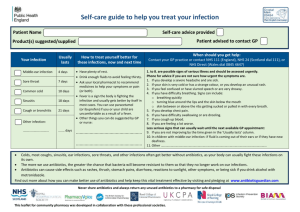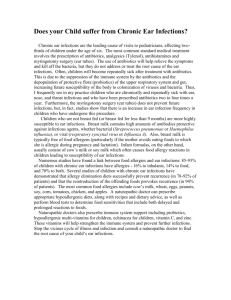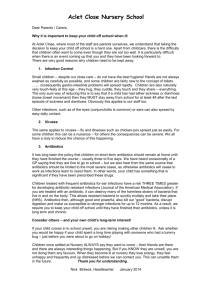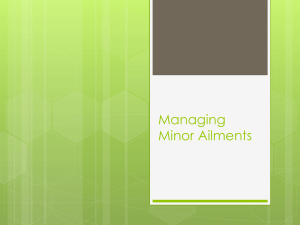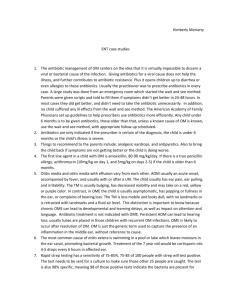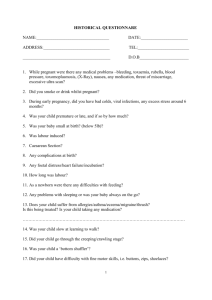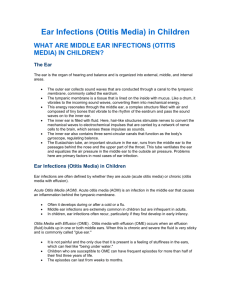a better way to fight ear infections
advertisement
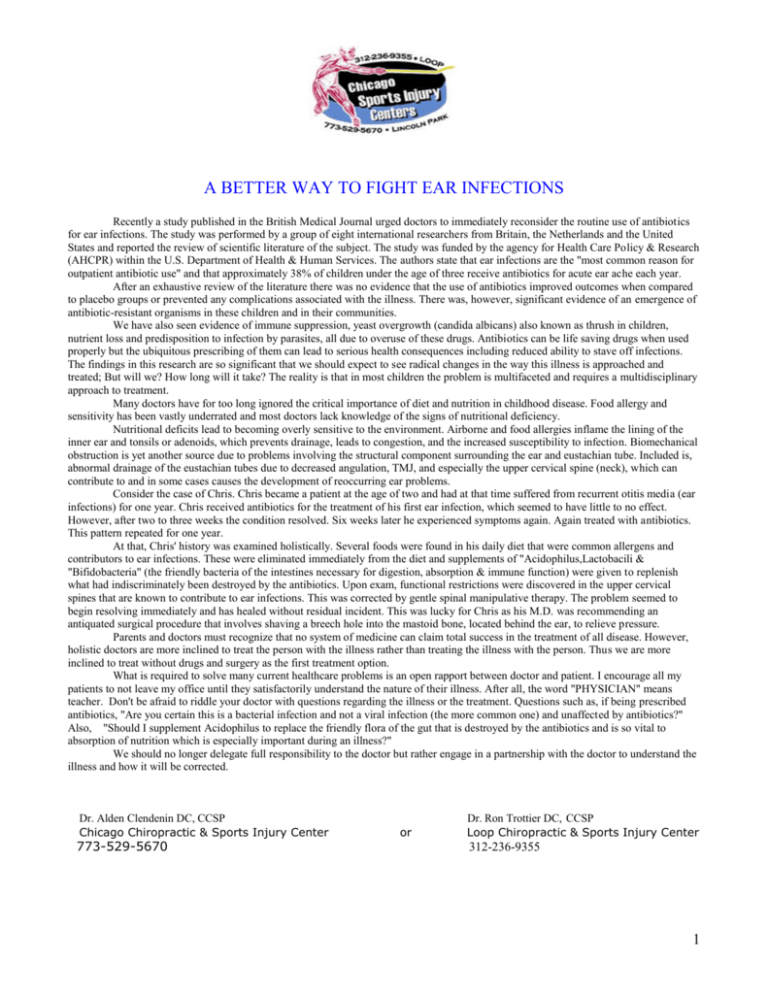
A BETTER WAY TO FIGHT EAR INFECTIONS Recently a study published in the British Medical Journal urged doctors to immediately reconsider the routine use of antibiotics for ear infections. The study was performed by a group of eight international researchers from Britain, the Netherlands and the United States and reported the review of scientific literature of the subject. The study was funded by the agency for Health Care Policy & Research (AHCPR) within the U.S. Department of Health & Human Services. The authors state that ear infections are the "most common reason for outpatient antibiotic use" and that approximately 38% of children under the age of three receive antibiotics for acute ear ache each year. After an exhaustive review of the literature there was no evidence that the use of antibiotics improved outcomes when compared to placebo groups or prevented any complications associated with the illness. There was, however, significant evidence of an emergence of antibiotic-resistant organisms in these children and in their communities. We have also seen evidence of immune suppression, yeast overgrowth (candida albicans) also known as thrush in children, nutrient loss and predisposition to infection by parasites, all due to overuse of these drugs. Antibiotics can be life saving drugs when used properly but the ubiquitous prescribing of them can lead to serious health consequences including reduced ability to stave off infections. The findings in this research are so significant that we should expect to see radical changes in the way this illness is approached and treated; But will we? How long will it take? The reality is that in most children the problem is multifaceted and requires a multidisciplinary approach to treatment. Many doctors have for too long ignored the critical importance of diet and nutrition in childhood disease. Food allergy and sensitivity has been vastly underrated and most doctors lack knowledge of the signs of nutritional deficiency. Nutritional deficits lead to becoming overly sensitive to the environment. Airborne and food allergies inflame the lining of the inner ear and tonsils or adenoids, which prevents drainage, leads to congestion, and the increased susceptibility to infection. Biomechanical obstruction is yet another source due to problems involving the structural component surrounding the ear and eustachian tube. Included is, abnormal drainage of the eustachian tubes due to decreased angulation, TMJ, and especially the upper cervical spine (neck), which can contribute to and in some cases causes the development of reoccurring ear problems. Consider the case of Chris. Chris became a patient at the age of two and had at that time suffered from recurrent otitis media (ear infections) for one year. Chris received antibiotics for the treatment of his first ear infection, which seemed to have little to no effect. However, after two to three weeks the condition resolved. Six weeks later he experienced symptoms again. Again treated with antibiotics. This pattern repeated for one year. At that, Chris' history was examined holistically. Several foods were found in his daily diet that were common allergens and contributors to ear infections. These were eliminated immediately from the diet and supplements of "Acidophilus,Lactobacili & "Bifidobacteria" (the friendly bacteria of the intestines necessary for digestion, absorption & immune function) were given to replenish what had indiscriminately been destroyed by the antibiotics. Upon exam, functional restrictions were discovered in the upper cervical spines that are known to contribute to ear infections. This was corrected by gentle spinal manipulative therapy. The problem seemed to begin resolving immediately and has healed without residual incident. This was lucky for Chris as his M.D. was recommending an antiquated surgical procedure that involves shaving a breech hole into the mastoid bone, located behind the ear, to relieve pressure. Parents and doctors must recognize that no system of medicine can claim total success in the treatment of all disease. However, holistic doctors are more inclined to treat the person with the illness rather than treating the illness with the person. Thus we are more inclined to treat without drugs and surgery as the first treatment option. What is required to solve many current healthcare problems is an open rapport between doctor and patient. I encourage all my patients to not leave my office until they satisfactorily understand the nature of their illness. After all, the word "PHYSICIAN" means teacher. Don't be afraid to riddle your doctor with questions regarding the illness or the treatment. Questions such as, if being prescribed antibiotics, "Are you certain this is a bacterial infection and not a viral infection (the more common one) and unaffected by antibiotics?" Also, "Should I supplement Acidophilus to replace the friendly flora of the gut that is destroyed by the antibiotics and is so vital to absorption of nutrition which is especially important during an illness?" We should no longer delegate full responsibility to the doctor but rather engage in a partnership with the doctor to understand the illness and how it will be corrected. Dr. Alden Clendenin DC, CCSP Chicago Chiropractic & Sports Injury Center 773-529-5670 or Dr. Ron Trottier DC, CCSP Loop Chiropractic & Sports Injury Center 312-236-9355 1
